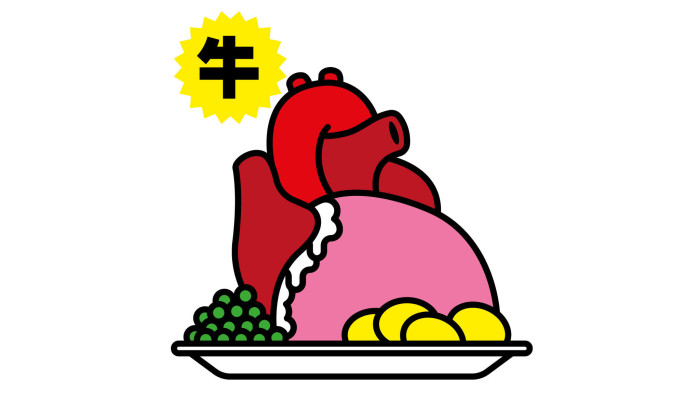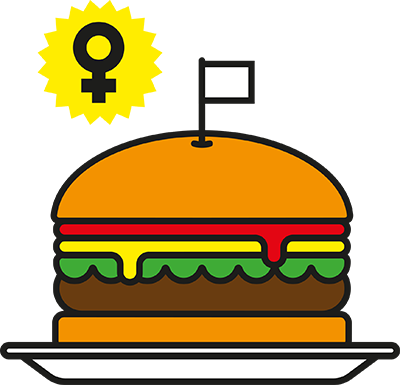Douglas Coupland on why he’s suspicious of vegetables

Roula Khalaf, Editor of the FT, selects her favourite stories in this weekly newsletter.
Last week I was in a New York restaurant near Lincoln Center where the waiter told the table the daily specials. We sat listening politely when, halfway through, he said: “And for tonight’s seafood offering we have female octopus seared on an iron grill and . . . ”
My brain pretty much stopped at the words female octopus and, even as I write these words here, perhaps part of me still remains seated there in that restaurant wondering if I’d correctly heard the seafood special: female octopus.
Making it further complicated, our server added: “The octopus has also been hand massaged.”
Wait: was she hand massaged before or after she was dead? And . . . is sexed meat now somehow a thing? When I order a steak, should I be asking if it’s from a boy or girl cow? Does male meat in general taste different from female beef? Does this have something to do with this whole new Angus cult that’s erupted over the past few years? And can I now custom order a . . . female hamburger? Basically: is meat having a sex the final piece of info that makes me go vegetarian?
What a large door our waiter opened so cavalierly.

***
On the other hand, there’s vegetables, and it’s not like they’re so innocent either. I know: Yay, vegetables! Hi, we’re vegetables! We’re your friends! But I really do think vegetables are a hoax, and I’m not going for effect here. I am genuinely suspicious of them. We’re all grown-ups. We all know that at this point in history, most modern democracies are run by lobbyists, and there are far more vegetable lobbyists than there are meat lobbyists, so it’s not hard to see why people became acculturated to make “that face” whenever I say no to arugula or spirulina or beets or whatever soil-based nonsense is foisted on to the table with a fake smile: Look, it’s vegetables! Yayyyy! I think we’ve all been brainwashed into thinking meat is bad and evil and too-high-up-the-food-chain-y — but, really, it’s just meat, and it’s been happening for a hundred thousand years. Meat = the food of kings. Vegetables = settling for less. Agree? Disagree? Go to the comments section right now — it’s 2017!
***
But it’s not like meat is such a hot idea, either. Meat: what a freaky word. It’s even scarier in German: Fleisch. How would you explain meat to Beatrix Potter’s hedgerow characters? Dear Gentle Creatures . . . meat occurs when you slaughter all of the larger farmyard animals and strip them of their hides and then segment their bodies into various bits, all of which have a destination: tenderloin tissue goes to restaurants where the serving staff have sleeve tattoos and masters degrees in architectural history; the hides go to shoemakers; the retinas, urethras, rectums and udders go to hot-dog manufacturers; everything else goes into either cat food or the insides of tinned raviolis.
***
My father was a surgeon but he also kept 30 cattle in British Columbia’s Fraser Valley. By being on the ranch on weekends, I was privy to maybe a dozen or so bovine midwifery episodes gone horribly wrong — it’s as if cows can’t just simply give birth — it was always: “Get the winch going and find me the blue axe.” And yet here I am, three decades later, still cheerfully ordering steak frites. Real-life trauma seems to count for nothing when it comes to determining when or how a person remains a carnivore. My father would come home from performing cardiac surgery only to say: “Bring out the roast and let’s get it carved.” No disconnect.
***
A few years back in Tokyo, I was with some expats going crazy for a good ol’ fashioned North American steakhouse, and there was a steak restaurant in Nakameguro where it was obvious the owners had spent time in suburban California and had tried really hard to nail the vernacular of the US steakhouse experience. So we cabbed over and got a table, and the interior smelled promisingly steaky. Then the menus arrived, all in Japanese, no English, and so we all began reading what they had and, after about 30 seconds, we all got . . . a chill. Every item on the menu had the character 牛 (gyu, or beef), followed by another medical-looking kanji which told a diner which part of the gyu one’s meal was coming from. It was basically a restaurant serving fetishistic bits of cow: tongue, shin, ear, cheek, bladder . . . and so on. We gagged and fled.
***
Speaking of that steaky smell, years later I read that Morrissey refused to perform at Coachella because the fumes from a nearby barbecue were permeating the stage. Good for him. It wouldn’t have put me off but I can understand why it would do so to him. He’s been vegetarian forever and I suspect that in his mind, eating meat must be akin to cannibalism — so I imagined what it might be like to be a non-cannibal in a cannibal world, and it must be hard. That smell? It’s just your uncle Gary on the spit. Want a slice?
***
When I say vegetables are a hoax, what I’m saying is that vegetables aren’t so innocent and cartoonishly good for you as a century of lobbying-funded indoctrination might have you believe. A case in point is waxy or “new” potatoes. They’re everywhere now, but they weren’t always. Why are they even here? It’s not because of flavour. New potatoes taste like paste. The reason we’re offered new potatoes (and not Idahos) is because farmers can net three, not two crops out of a field per year. It’s money. We’ve been indoctrinated into thinking that new potatoes are better than old potatoes — yet they’re not; they taste like nothing, and they don’t mash, and they make terrible french fries and yet everyone says: “Weeeee . . . happy little new potatoes!” There’s an entire generation out there that thinks a potato is a candle-wax little ball that doesn’t mash or scallop or julienne or do anything else.
To be even more recent, look at chickpeas. Ooh . . . hummus is so delicious and trendy! We’re all so lucky! No. Chickpeas are only moderately tasty, and if you didn’t grow up with them, you probably won’t like them, and the only reason they’re trendy is because they grow well on soil formerly used for tobacco. There’s a lobbying push on to connive diners into chickpea bliss. It’s lobbying.
***
My big beef (. . . zing! Ironic word choice noted) is salad, which I’ve trashed in these pages before, but let me be clear: salad is a cruel ritual foisted on to us by multiple generations of do-gooders. They’ve all acted with a distorted sense of benevolence in their hearts, but only after they’ve been indoctrinated into consumer complicity. Don’t be fooled: salad is the sick result of Big Vegetable and its relentless lobbying and remoulding of western dietary habits. Think like a scientist: vegetables with all their surface area soak up vast amounts of pesticides, fungicides, miticides, larvicides, rusticides, algaecides, antimicrobials, biocides, nematicides, rodenticides and genetic modification in order to get from California’s central valley region to your vegetable crisper. Can all of that be good for you? No. That stuff is nasty, carcinogenic and mutagenic. It builds up inside your muscles and fat and is almost impossible to remove. Oh, weeeeee! But it’s vegetables! And vegetables are good for you! And vegetables want to put toxins into your spleen so you die earlier than you might have otherwise.
***
To slightly change the topic, I’ve noticed that the level of doneness of meat that one selects at a restaurant has become something people are rather judgey about.
“How would you like your steak cooked this evening?”
“Medium rare.”
“Excellent. Can I also offer you a wonderful Zinfandel and a subscription to Monocle magazine to accompany it?”
“Why, yes, please do.”
Alternate scenario:
“How would you like your steak cooked this evening?”
“Well done, please.”
[Awkward silence] “Are you sure that’s how you’d like it cooked, monsieur?”
“Yes. Yes I am.”
[More silence] “Can I also offer you a juice box and a Finding Nemo colouring book to accompany it?”
“Yes, please. Bring it on. Do you have a bib?”
***
I just came back from Sunday dinner at my mother’s house: roast beef, cauliflower with cheese sauce, mashed RUSSET POTATOES and gravy. Yes, that is correct: it was a perfect meal. But then after dinner, a family friend popped by and, while everyone was hanging out in the kitchen, I looked at the (literal) carnage on the plates and pans on the counters and I made a joke that, ha ha, we’d been dining on hitchhikers that evening. It was like one of those nature photographs of wolves whose grey fur is bloodstained after an afternoon of gorging on the flesh of a caribou.
Blood is just so incredibly bloody looking. It’s red. It smells like metal. It smells like coins.
***
I collect meteorites. I do. Not many but I’m always on the lookout for ones with character. For me, the most beautiful specimens come from Argentina, from a group of iron meteorites from a region called Campo del Cielo : Field of Heaven. It’s an area about 600 miles north-west of Buenos Aires that’s 2 x 11 miles in size, and bears the impact of 26 meteorite strikes that occurred roughly 4,500 years ago. The total weight of the pieces so far recovered exceeds 200,000 pounds, making it the heaviest meteorite strike ever recovered on Earth. The strike’s iron/nickel/cobalt chunks possess a meteorite characteristic known as “thumb-printing”, which is to say they look like blobs of clay that someone’s gone and pressed their thumbs into, making them look kind of arty-crafty and very, for lack of a better word, “meteorite-y”. They’re gorgeous.
When I began collecting meteorite specimens, I’d take them to a metal shop run by an art school friend, and I’d have the meteorite bottoms sliced off in a specific way in order to make them stand on a flat surface like they came from a Chinese river valley — like philosopher’s stones. Loki, the guy running the shop’s metal saw, began slicing the meteorites but freaked out. I asked him what was going on, and he said: “Doug, what if there’s some freaky space virus or something inside the meteorite?”
I said to him: “Loki, you know, for five miles around you into the sky and into the planet — this meteorite is the one place where you have 100 per cent assurance that there’s zero chance of finding life. You’ll be safe.” Slicing resumed.
But here’s the thing: these meteorites are mostly iron, and iron is one of the most stable elements in the universe. It’s everywhere, and even a trillion light years away it’s as common as it is here on Earth. Iron is also essential to haemoglobin, a staple of life on this planet. If you lick a meteorite, it smells just like a summer camp scab. Wet a meteorite and smell it up close and it smells alive — which is kind of beautiful — and it’s why I collect meteorites; in a weird way they smell like meat. Their smell allows me to believe that life exists almost everywhere in the universe wherever and whenever it can. Meteorites are just emails from the gods telling us we’re not alone, and I like that.
Douglas Coupland’s new collection of stories and essays ‘Bit Rot’ is published by William Heinemann (£20). @dougcoupland
Illustrations by James Joyce
Comments